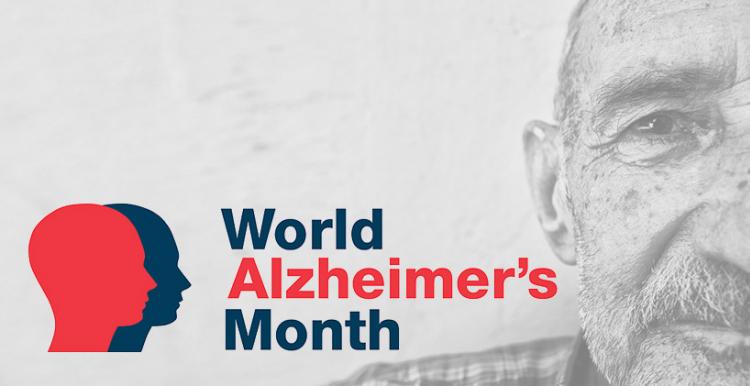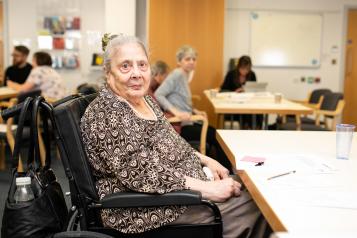World Alzheimer's Month

The information in this article is taken from www.alzint.org
The theme for the 2021 campaign is Know Dementia, Know Alzheimer’s and it is all about the power of knowledge. During the campaign, we are shining a light on the warning signs of dementia and the importance of a timely diagnosis.
In seeking out information, advice and support, and potentially a diagnosis, people are better able to prepare, to plan and to adapt.
Warning signs of dementia
Every person is unique and dementia effects every individual differently, with no two people experiencing symptoms in exactly the same way. Symptoms also vary by type of dementia. Alzheimer’s disease is the most common type of dementia. 10 of the most common warning signs are shown below:
- Memory loss
- Difficulty performing familiar tasks
- Problems with language
- Disorientation to time and place
- Poor or decreased judgement
- Problems keeping track of things
- Misplacing things
- Changes in mood and behaviour
- Trouble with images and spatial relationships
- Withdrawal from work or social activities
If these signs are new, they may be a sign of dementia. Dementia is not a part of normal aging. If you think that these problems are affecting your daily life, or the life of someone you know, you should talk to your doctor or seek out more information from your national dementia of Alzheimer’s association.
If you are worried about your own memory, or that of someone close to you, it’s important to consider seeking help so that you can receive an accurate diagnosis. This process will vary from country to country – but it’s generally good to start with your doctor or general practitioner (GP).
Discussing your concerns with your doctor and having an examination can exclude other treatable conditions that can cause memory loss such as depression, urinary tract infection, vitamin deficiencies, a brain tumour or thyroid problems.
Dementia is not a normal part of ageing, so getting a diagnosis can help you take control and plan ahead.
Benefits of a timely diagnosis
Taking the first steps to seek a diagnosis can be scary, but there are benefits to having an early diagnosis. You may have been wondering what is happening to you and have been worried and anxious about the changes you have noticed. Although being diagnosed with dementia can be an upsetting experience, it can also be a relief because knowing the causes of your problems can resolve the anxiety felt by both you and your family.
Receiving a timely diagnosis of dementia will enable you to:
- Gain access to information, resources and support for yourself and those close to you
- Demystify and destigmatise your condition
- Maximise your quality of life
- Benefit from support and available drug and non-drug therapies that may improve your cognition
- Plan for the future
- Explain to your family, friends and colleagues what has changed in your life and how they can help you
Frequently asked questions about Dementia
What are the early symptoms of dementia?
The early symptoms of Alzheimer’s disease and other types of dementia can vary; however, there are broad similarities shared between them all. These similarities include the most common sign of memory loss and the loss of practical abilities, both of which can lead to somebody withdrawing from work or social activities.
Dementia affects each person differently. No two people will have symptoms that develop in the exact same way. Your personality, general health and social situation are all unique factors that can determine the impact dementia is likely to have on your day-to-day life.
My mum has dementia, will I get it?
It is only in a few rare cases where Alzheimer’s disease runs in families. In these types of cases, there is a direct link between an inherited mutation in one gene and the onset of the disease. There are rare familial forms of dementia caused by genetic mutations such as familial Alzheimer’s disease, frontotemporal dementia and familial vascular dementia, which are more likely to occur in people under the age of 65. For families where this is the case, family members, such as brothers, sisters and children, have a one in two chance of developing Alzheimer’s disease.
Is there a cure?
At the moment, there is no cure for Alzheimer’s disease or dementia.
Researchers are still in the stages of developing drugs that can slow down the progression of the disease. However, they still do not know how to prevent different types of dementia from occurring or how to reverse its effects. With more research invested into the causes of dementia, it is hoped that more effective treatments may become possible over time.
One of the best ways you can reduce your risk of developing Alzheimer’s disease or dementia is by engaging in healthy behaviours, both mentally and physically. An important mantra to remember is this: what is good for your heart is good for your brain.
Are there any drug treatments?
While there are no drugs that can cure Alzheimer’s disease, there are a number of drug treatments which can help treat symptoms and slow progression of the condition. The main class of such compounds is the cholinesterase inhibitors.
Sometimes people may opt to use drugs which control some of the symptoms of Alzheimer’s disease, such as sleeplessness or agitation. However, it is recommended that the use of drugs such as sleeping pills or tranquilisers, be kept to a minimum as they may lead to increased confusion. Non-drug treatments, including practical and emotional support, are equally important and effective. We recommend that all people living with dementia, as well as carers and loved ones, seek out support.
Can dementia be prevented?
Unfortunately, not enough is known about what causes Alzheimer’s disease for us to be able to recommend that anything will prevent it.
Although we know that Alzheimer’s disease is more common as we get older, what triggers the characteristic changes that take place in the brain tissue of someone with Alzheimer’s disease, is not known.
Our genes may play a part in the development of most cases of Alzheimer’s disease and in rare cases, abnormal genes may actually cause it. But much more commonly, genes are believed only to contribute to a person’s susceptibility. In some cases, factors in the environment may be necessary to trigger the illness.
While there are no specific preventative measures we can recommend, what we do recommended is a healthy lifestyle: eating a balanced diet, staying physically, mentally and socially active, not smoking and not drinking too much alcohol. There is increasing research evidence to suggest that having a healthy lifestyle helps to reduce an individual’s risk.
For further support
- Wigan Dementia Action Alliance - The Wigan Dementia Action Alliance is made up of organisations across the whole borough of Wigan, working together to radically improve the lives of people living with dementia and their carers.
- Wigan Alzheimer's Society Dementia Advisers - Wigan Alzheimer’s Society Dementia Advisers provide information, advice and signposting to people with dementia and their carers. This is provided at the point of diagnosis and throughout the dementia journey. Call 0333 150 3456 or email wigan@alzheimers.org.uk
- Wigan Borough Dementia Friendly Community - The Wigan Borough Dementia Friendly Community includes local and national organisations and charities, as well as people living with dementia who all have a common goal to share best practice and take positive action on all things dementia. Email Wigan.DAA17@gmail.com
- Later Life and Memory Service - The Memory Assessment and Treatment Services support people with memory problems like dementia, providing assessment, diagnosis and treatment across Wigan and Leigh. Call 01942 764462.
- The Lewy Body Society - The Lewy Body Society provide information and resources for patients and carers. Their mission is to fund clinical research to improve the diagnosis and treatment of the disease and raise awareness of Lewy body dementia among the general public and those in the medical profession and decision-making positions.


